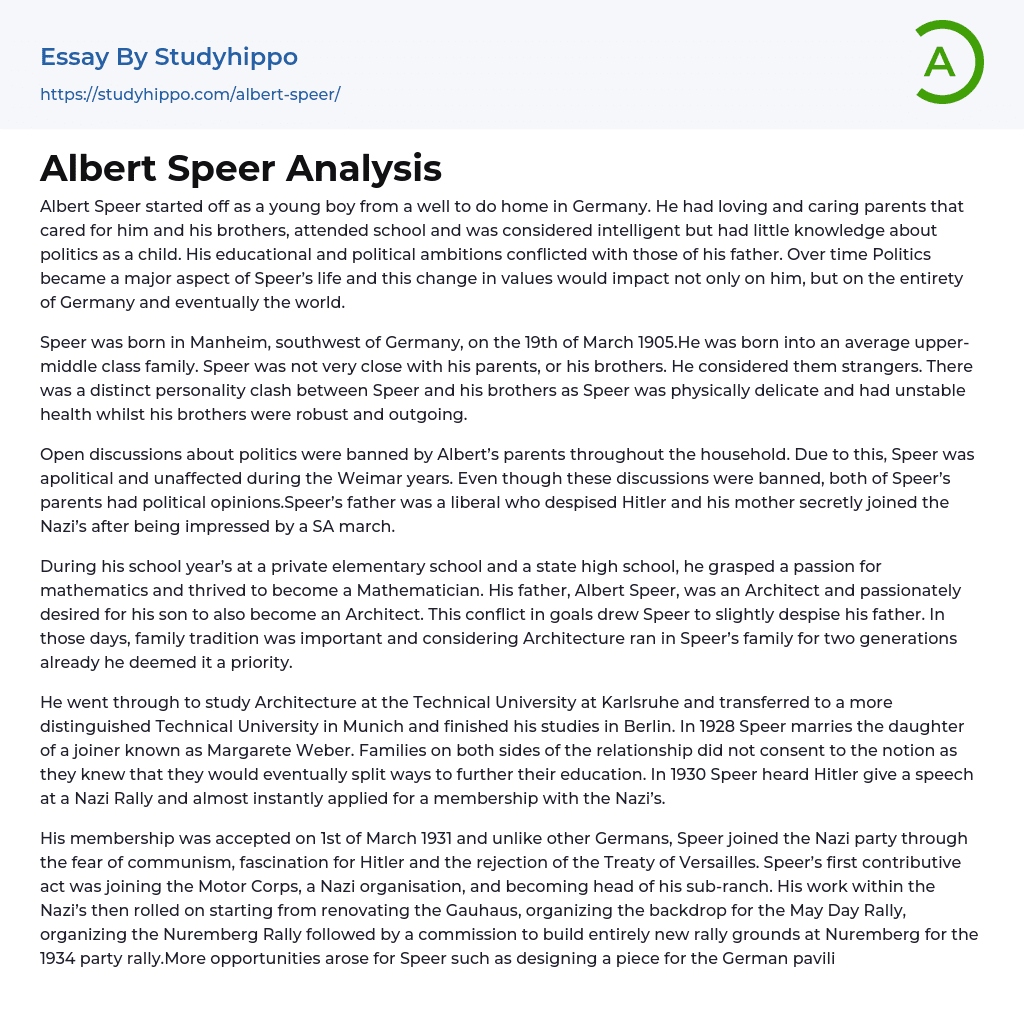Albert Speer was initially a young boy from a privileged family in Germany, with parents who were affectionate and attentive to him and his siblings. Despite being perceived as intelligent and attending school, he had limited understanding of politics during childhood. However, as he pursued his education and political aspirations, conflicts arose with his father. Politics gradually became a crucial part of Speer's existence, resulting in a transformation of his beliefs that ultimately had consequences for not only himself but also Germany and the world at large.
Speer, who was born on March 19th, 1905, in Manheim, German Southwest, came from a moderately upper-class family. Despite being an average family, he kept distant from his parents and his siblings, whom he found unfamiliar. Being physically frail and having precarious health, Speer clashed with his outgoing and robust brothers.
Albert'
...s parents prohibited political discussions within their household, resulting in Speer remaining apolitical and unaffected during the Weimar era. Despite the ban, both of his parents held political views - his father was a liberal who disliked Hitler, whereas his mother covertly joined the Nazi party after being impressed by a SA march.
During his education at a private elementary school and a state high school, he grew to love mathematics and had ambitions of pursuing a career as a Mathematician. Nevertheless, his Architect father wished for him to continue the family tradition, leading Speer to feel some animosity towards him. Despite this tension, Speer felt compelled by familial duty to prioritize Architecture.
Speer studied Architecture at the Technical University in Karlsruhe, but then transferred to a more prestigious Technical University in Munich before completing his studies in Berlin. H
married Margarete Weber, the daughter of a joiner, in 1928. However, their families didn't approve of the relationship because they knew that both would eventually have to separate to pursue their studies. In 1930, after hearing Hitler's speech at a Nazi Rally, Speer promptly sought membership with the Nazi party.
In 1931, Speer joined the Nazi party due to his fear of communism, attraction towards Hitler and rejection of the Treaty of Versailles. His initial involvement was with the Motor Corps where he became head of his sub-ranch. He began working for the party by renovating the Gauhaus and creating backdrops for rallies. This led to bigger opportunities such as designing for the Paris World Exhibition and rebuilding a new chancellery. As he rose through ranks in the party, he obtained various titles including Inspector General of Construction in 1937 and was commissioned to build new rally grounds for the 1934 Nuremberg party rally.
Speer was appointed as the First Architect of the Reich in 1934, and later became Inspector General of construction in 1937. In 1942, he simultaneously assumed the roles of chief of ‘Organisation Todt’ and Minister of Armaments and Munitions.
- Elie Wiesel essays
- Nazi Party essays
- Weimar Republic essays
- Holocaust essays
- Adolf Hitler essays
- Concentration Camps essays
- Anne Frank essays
- Culture essays
- Social Control essays
- Citizenship essays
- Social Justice essays
- Caste System essays
- Social Responsibility essays
- Socialization essays
- Deviance essays
- Modern Society essays
- Popularity essays
- Civil Society essays
- Community essays
- Female essays
- Filipino People essays
- Igbo People essays
- Indigenous Australians essays
- Indigenous Peoples essays
- Minority Group essays
- Social Institution essays
- Men essays
- The nation essays
- Middle Class essays
- Social Norms essays
- Discourse Community essays
- Popular Culture essays
- Car Culture essays
- American Culture essays
- Mormon essays
- Indian Culture essays
- Mexican Culture essays
- Pop Culture essays
- Cultural Differences essays
- Culture Shock essays
- Different Cultures essays
- D-day essays
- Fascism essays
- 1920S essays
- 1950S essays
- 1960S essays
- 19Th Century essays
- 20Th Century essays
- Ancient Greece essays
- Bravery essays




